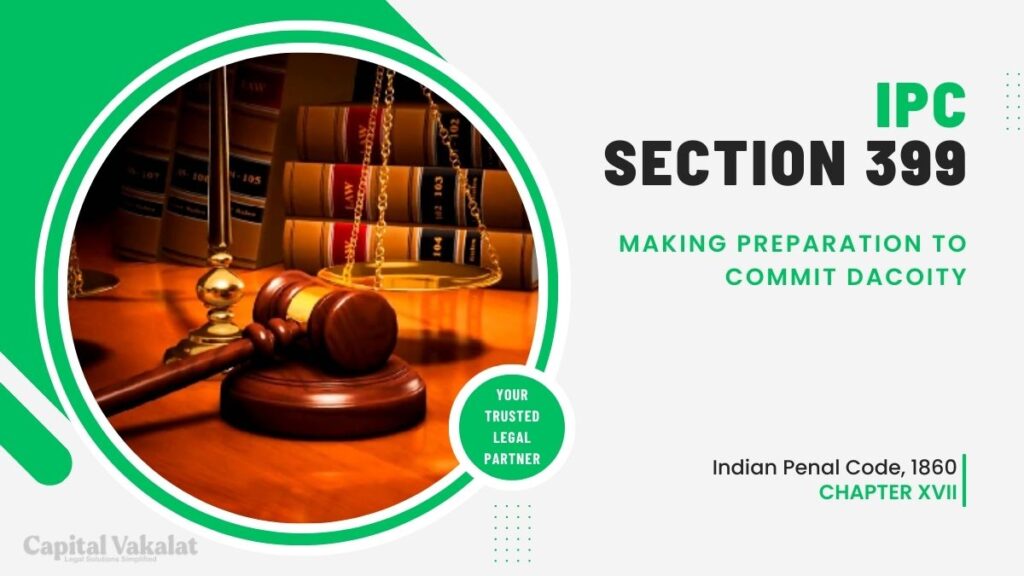In the realm of criminal law in India, Section 399 IPC holds a significant place, outlining the offense of making preparation to commit dacoity. This provision plays a crucial role in maintaining public safety and order by addressing the premeditated planning of a serious criminal act.

Understanding the nuances of Section 399 IPC is paramount, as it sheds light on the legal consequences individuals may face when involved in activities that lead to dacoity.
Understanding Dacoity
Before delving into Section 399 IPC, it’s essential to comprehend the gravity of the offense it addresses—dacoity. Dacoity involves a group of individuals conspiring to commit robbery with violence or threat of violence. The severity of the crime is evident, considering its potential impact on the safety and security of the public.
Historical Context of Section 399 IPC
To truly grasp the implications of Section 399 IPC, one must explore its historical context. This provision has evolved over time, shaped by legal precedents and landmark cases. The historical backdrop provides insights into the legislative intent and the societal concerns that prompted the creation of such a provision.
Preparation to Commit Dacoity Defined
Section 399 IPC specifically deals with the act of making preparation to commit dacoity. It becomes imperative to analyze what constitutes “preparation” under this provision and distinguish it from other criminal activities. This section aims to preemptively address criminal plans before they materialize into full-fledged dacoities.
Legal Consequences of Violating Section 399 IPC
The legal landscape surrounding Section 399 IPC includes stringent penalties and punishments for those found guilty of making preparations to commit dacoity. Examining past cases provides insights into the application of the law and how it has been instrumental in curbing potential threats to public safety.
Intent and Mens Rea in Section 399 IPC
Intent plays a pivotal role in criminal law, and Section 399 IPC is no exception. This section demands a thorough examination of the mental state of individuals involved—establishing mens rea. Understanding the nuances of intent is crucial in legal proceedings related to Section 399 IPC.
Challenges in Enforcing Section 399 IPC
Enforcing Section 399 IPC poses unique challenges for law enforcement agencies. Investigating and proving the preparatory acts require a keen understanding of criminal methodologies, and addressing loopholes in the legal framework is an ongoing endeavor to enhance the effectiveness of the provision.
Landmark Cases Involving Section 399 IPC
Analyzing landmark cases that have invoked Section 399 IPC provides a deeper understanding of its practical implications. These cases set legal standards and contribute to the continuous evolution of the provision, shaping the landscape of criminal jurisprudence.
Public Awareness and Prevention
Preventing dacoity and its preparations requires not only legal measures but also public awareness. Educating the community about Section 399 IPC and the consequences of making preparations for dacoity is integral to fostering a safer society. This section explores strategies for prevention and community involvement.
Conclusion
In conclusion, Section 399 IPC serves as a crucial legal tool in preemptively addressing the threat of dacoity. Its historical evolution, legal consequences, and the challenges faced in enforcement underscore its significance in maintaining law and order. As society evolves, so too must our understanding and application of Section 399 IPC to ensure its continued effectiveness.
Frequently Asked Questions
What distinguishes dacoity from other forms of robbery?
Dacoity involves a group of individuals committing robbery with violence or threat of violence. The collaborative nature and severity of the offense set it apart from other forms of robbery.
How does mens rea play a role in Section 399 IPC?
Mens rea, or the guilty mind, is crucial in establishing intent in Section 399 IPC cases. It helps determine the mental state of individuals involved in making preparations to commit dacoity.
What challenges do law enforcement face in enforcing Section 399 IPC?
Law enforcement encounters challenges in gathering evidence of preparatory acts and addressing potential loopholes in the legal framework, making enforcement a complex task.
How can the public contribute to preventing dacoity?
Public awareness and cooperation are key. Communities can actively engage in crime prevention programs, report suspicious activities, and support law enforcement efforts to create a safer environment.